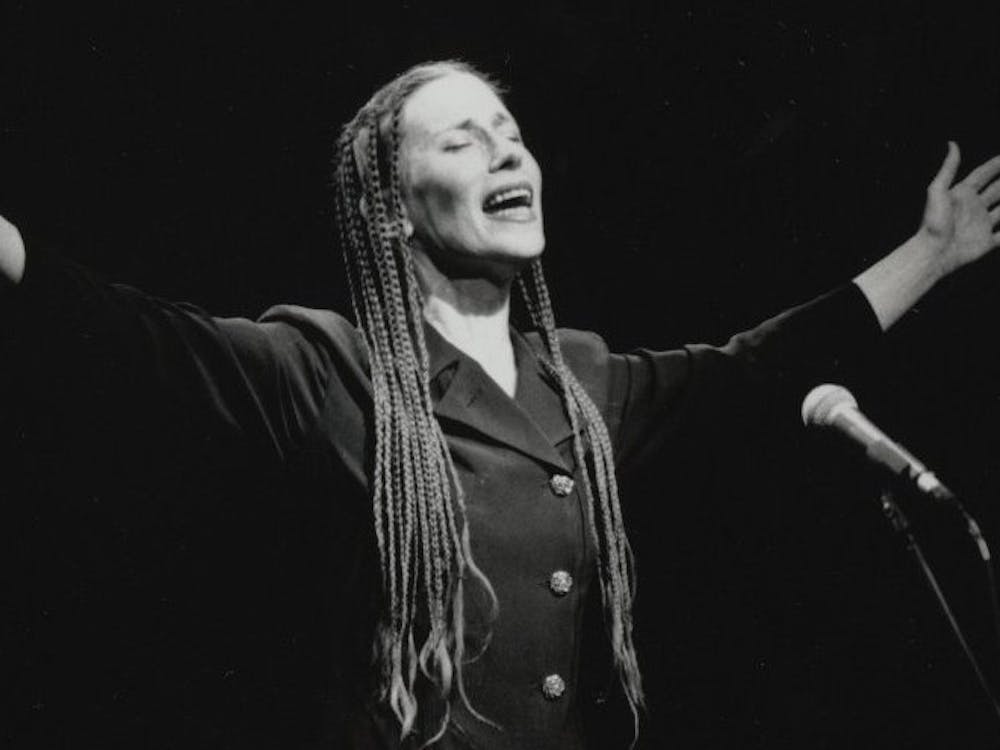Remembering is hard work.
Right now, looking back is emotional, simultaneously numb and raw. It feels like a hard, stony lump lodged in my throat. It feels like the longing for the closeness of human bodies and voices when the closest approximation takes place over a laggy Internet connection. It is this complexity of remembering, painful, yearning and sometimes joyful, that Meredith Monk captures in her album “Memory Game,” a critical look at nine works from her career in experimental performance.
Monk, who was born in 1942, is an American vocalist, composer and interdisciplinary artist known for her role in inventing and promoting extended vocal techniques. In 2015, Barack Obama awarded her the National Medal of the Arts, the highest honor given in recognition of the arts in the United States. Her compositions follow minimalist composers like John Cage and Terry Riley, but they branch into a marvelously eclectic oeuvre spanning film, drawing, dance and theater. The term “interdisciplinary” seems custom-made for an artist like Monk, who has in turn influenced artists ranging from Bruce Nauman to Björk.
Long known for her unique process of composing, Monk tends to create works that require improvisation and intensive rehearsal with each musician. Performers learn their parts by ear, and few scores exist of her work. That’s what makes “Memory Game” so unusual. Monk allows her vocal ensemble and Bang on a Can All-Stars, a new music ensemble, to take the lead and rework nine of her songs, spanning the years 1986 to 2008.
Unlike Monk’s other works, “Memory Game” has a thicker instrumental texture that comes from the interweaving of winds, percussion and strings. It begins with five tracks from Monk’s sci-fi opera “The Games,” a post-apocalyptic work of music and theater. In this desolate, futuristic world, implied to be after a nuclear holocaust, humans enact ritualistic games to commemorate their time on Earth.
“Spaceship” takes off with a simple five-note motif that washes over the listener in gentle waves and creates a sense of distance through a quasi-Doppler effect. While “Gamemaster’s Song” is upbeat, playful and parodic, with sly laughs and a synthesizer riff, it adds unexpected leaps in falsetto and a robust, grassy bass. Words alluding to the games (“first game,” “first round”) are spoken in both English and German, unsurprising given that “The Games” was first commissioned by Berlin Schaubuehne Theater.
The album progresses with a melancholic tale of what happened to humans and language after the apocalypse. “Migration” is narrated by a disembodied, detached voice (Michael Cerveris) that details the characteristics of people on Earth, a population that has vanished in the bleak world of “The Games.”
Most striking of the album’s excerpt from “The Games” is “Memory Song,” which evokes the tinkling of an old-timey, childhood music box — the kind with a ballerina revolving before a mirror. Monk’s vocal ensemble sings snippets of language with childlike innocence: “Trees, trees, trees. Trees, birds. Trees, birds, coffee, coffee, coffee?” Words, fragmented and syncopated, interspersed with syllables, seem to have lost meaning. Language has been shattered beyond repair, save for one human, who sings with haunting dread, “Do you remember? ... I remember candlelight. I remember early morning coffee.” The song ends with the devolution of human language through prolonged cawing and squawks, ululations of the voice more bird than human.
Monk doesn’t leave the listener without hope, though. “Waltz in 5s” is part of her wordless 1996 oratorio “The Politics of Quiet,” which imagines a contemplative space with shared understanding. Instead of a post-apocalyptic and violent landscape where language has devolved into unintelligibility, Monk is after wordlessness of a different sort, of the quiet and sacred. A brittle, open string solo leads into sonorous, operatic vocals that evoke Gregorian chant.
Signs of life pervade the rest of the album. Maracas buzz like cicadas in the humid night in “Tokyo Cha Cha.” The longest work by far, it’s an invitation to dance and to play through Monk’s tremendous vocabulary of vocal techniques: tintinnabulation, syllabic repetition, glottal sounds, vocal tremolos, all accompanied by snappy interjections from the accompaniment. Immediately following is “Totentanz,” which possesses a gritty edge with a driving beat. It feels expectant, urgent, unsettled and unbalanced, with percussion clanging throughout the piece. It rattles with impatience, demanding and cranky and vibrant, full of life.
The last song in “Memory Games” made me start with surprise, laugh and smile. “Double Fiesta” is classic Meredith Monk. Her voice is supple, capable of vertiginous leaps and sounds that are exploited to full effect. Piano, marimba and guitar are relegated to the background in order to display pure vocal excess, in the best way possible — mewling, cooing, quavering, warbling, wailing, keening, pursed-lip vibrato. It’s gloriously alive.
The album breathes. What defines “Memory Game” is the pronounced inhalation and exhalation of all kinds: high and tight, low and relaxed and slow, quick and hurried. Each work is wordless but vocal, survival chants and incantations that seem tailored for this moment, when words fail.
Words fail when we see how the world is so nonchalant toward its children. Words fail where emotions triumph, that inarticulate void of what used to be and what will no longer be. Monk vocalizes precisely that failure. With shouts of joy and wails of pain, “Memory Game” looks to the past and to the future. It is both ancient and timeless, connecting to the humanity in all of us.
Get The Chronicle straight to your inbox
Sign up for our weekly newsletter. Cancel at any time.

